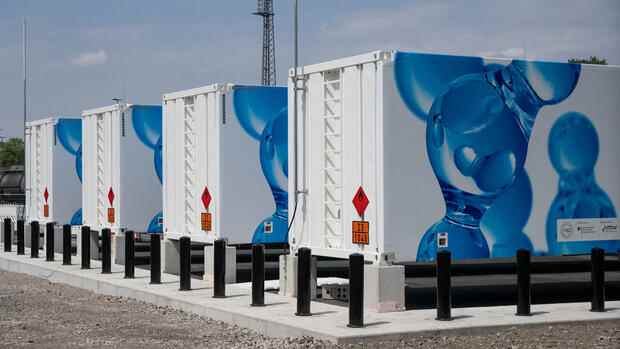Frankfurt Professional investors can now participate in a new hydrogen fund called Senco Hydrogen Impact Fund. Behind the project are former bank managers, investment experts and engineers from Germany.
Matthias Wargers, Managing Partner at the fund operator Senco Hydrogen Capital, explains: “The target volume for the fund is 500 million euros, the investments will typically be between 35 and 70 million euros. In addition to this equity share, there is also external financing and, if necessary, subsidies.”
He was one of the founders and longtime CEO of EAA, Germany’s first “bad bank”, which wound up the legacy of Landesbank WestLB. Now, with other partners and experts, he wants to use the momentum on the subject of hydrogen, which is being additionally driven by the gas crisis.
“Hydrogen is already an essential raw material for industry, for example in the production of fertilizers and fuels. It is currently made from 95 percent CO2-releasing natural gas. This must change as soon as possible in order to achieve the industry’s decarbonization goals,” says the 56-year-old manager.
Top jobs of the day
Find the best jobs now and
be notified by email.
Due to the current supply bottlenecks and rising prices for natural gas, the profitability of green hydrogen, which is obtained from renewable energies and water, is being achieved even faster.
Ex-RWE boss advises the fund operator
Carsten Schmeding, CEO at Senco Hydrogen Capital, says: “We will acquire minority and majority stakes in companies along the hydrogen value chain. These can also be supplier companies in Germany and Europe that produce compressors or membranes, for example.”
Many of these companies now work with small quantities, similar to a manufactory, explains the managing partner: “We can then expand production capacities, for example, to meet growing demand. In total, we currently have around 200 companies on the screen.”
>> Read here: Hydrogen, Wind, Biomass: How Japan Invents the Clean Ocean Giant
In addition, infrastructure projects are also interesting, such as plants for hydrogen production, transport systems or storage solutions. The fund operator’s advisors include so-called senior experts, including former RWE boss Jürgen Grossmann and professor Julia Hartmann from the EBS Business School.
Target return is 18 percent
The private Senco Hydrogen Impact Fund wants to finance the topic of hydrogen on an industrial scale and make it accessible to investors such as insurance companies and utility companies. The targeted gross return is 18 percent.
The industrial partner in the fund is the Munich-based industrial group Siemens, which is helping to set up and operate the systems. “Our cooperation begins with the search for suitable locations for hydrogen production facilities and includes the realization of the projects. NordLB is a partner for external financing,” says CEO Schmeding.
The fund operator’s advisors also include the former RWE boss.
(Photo: dpa)
Federal Research Minister Bettina Stark-Watzinger (FDP) also said recently: Since green hydrogen can be produced far more cheaply in Australia, Africa or South America, for example, Germany will “always remain an import country”. However, in order to make hydrogen technology an “export hit made in Germany”, production must be promoted nationally.
The investment funds, which have been used to success, are currently dealing with more difficult framework conditions. One reason is the rise in interest rates, which make the borrowed capital in the transactions more expensive. “The German private equity business climate has continued to cool down after the weak start to the year,” says Fritzi Köhler-Geib, Chief Economist at KfW.
>> Read here: “The climate club is in a coma”: How China and the US are jeopardizing the future of the earth
The investor barometer for private equity from KfW and the industry association BVK fell by 17.8 points to minus 24.7 points in the second quarter. Interest rate and economic fears weighed on the private equity market. However, it is pleasing how well the deal flow has held up so far in this environment. Investment opportunities are still there, says Köhler-Geib.
Senco manager Wargers now sees an opportunity to benefit from the upheaval in the energy market. “According to international studies, the EU’s climate targets require a total of around 400 billion euros in investments by 2030. The potential for possible investments is therefore very large.” However, here too the business models must be robust and the valuations must be appropriate.
More: Research Minister Stark-Watzinger: “Hydrogen technology must become an export hit.”
